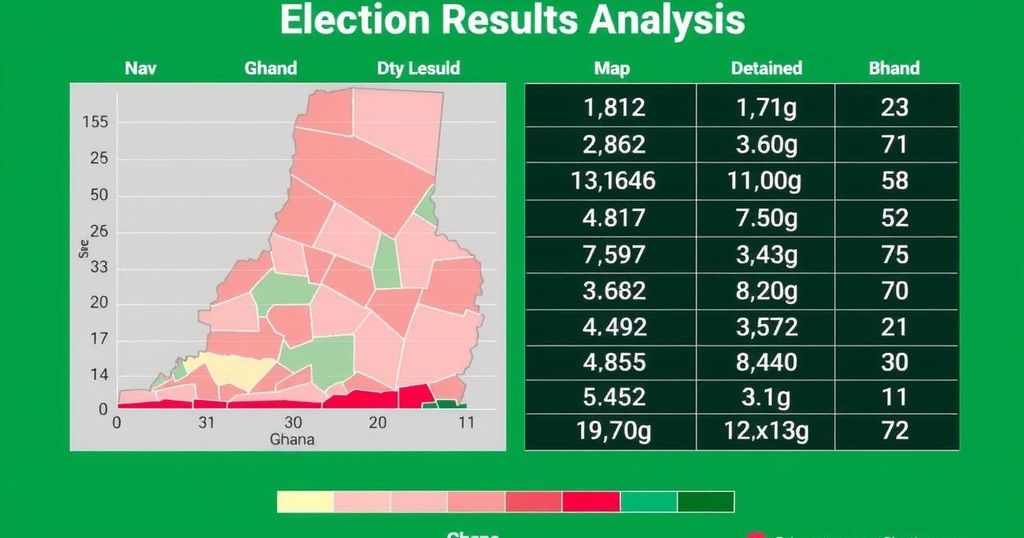Ghana’s 2024 Election Results: NPP Loses to NDC Amid Economic Crisis

In the 2024 Ghanaian elections, the ruling New Patriotic Party (NPP) was defeated by the opposition National Democratic Congress (NDC), led by John Mahama. Economic dissatisfaction, marked by high inflation and unemployment, played a crucial role in shaping voter sentiment against the NPP. This election also highlighted increasing public demand for accountability amid allegations of corruption and the ineffectiveness of government policies, resulting in a significant shift in parliamentary representation.
In Ghana’s 2024 elections, the ruling New Patriotic Party (NPP), led by incumbent President Nana Akufo-Addo and Vice President Dr. Mahamudu Bawumia, suffered a significant defeat against the opposition National Democratic Congress (NDC) headed by former President John Mahama. This election marked a pivotal moment in Ghanaian politics, as the NPP aimed to break the historical pattern of term limits; however, widespread public discontent regarding economic mismanagement ultimately influenced voter sentiment. High inflation, unemployment, and claims of government corruption factored heavily into the electorate’s decision-making process, leading to an impressive victory for Mahama and the NDC.
Throughout Ghana’s democratic journey since 1992, no party has successfully maintained power beyond eight years, a trend that the NPP sought to disrupt with their campaign slogan promising to “break the eight.” The party faced mounting criticism and public backlash for their handling of the economy, which was described by various economic analysts as the worst in Ghana’s recent history. Economic surveys conducted prior to the elections indicated a growing dissatisfaction among citizens, revealing that high rates of inflation and a rising cost of living created a climate of discontent, effectively diminishing support for the NPP.
The government’s attempts to emphasize initiatives such as free senior high school education and digitalization failed to resonate with voters who were more concerned about the immediate challenges of affording basic necessities. Furthermore, the implementation of multiple taxes, including a controversial electronic transfer levy, provoked considerable outrage among young citizens struggling to find employment opportunities in a competitive job market.
Moreover, corruption allegations overshadowed the NPP’s campaign, as numerous civil society organizations highlighted cases of nepotism and insufficient oversight on government contracts. The enduring plight of illegal mining in the country further exacerbated public frustration, particularly when it was reported that political party members were implicated in these illicit activities, prompting widespread protests from the youth.
As a result of the discontent, the NPP experienced substantial losses in both parliamentary seats and regional support. In key regions that had previously been strongholds for the party, there was a noticeable shift towards the NDC. The results of the election revealed not only a change in leadership but also indicated how sensitively voters responded to the prevailing economic climate and governance issues.
Consequently, this election result aligns Ghana with a growing trend across Africa, where ruling parties face electoral defeat against otherwise well-organized opposition movements, particularly amid crises of governance and accountability. Recent political events in countries such as Botswana, Mauritius, and Senegal underscore the importance of assessing the accountability of ruling parties in the face of national challenges. As Ghana embarks on a new chapter under President Mahama’s leadership, the implications of these election results will require careful monitoring as the nation grapples with ongoing economic challenges and the demand for greater transparency.
The 2024 Ghanaian elections culminate in a significant defeat for the ruling party, highlighting the delicate balance between governance and economic stability. Political scholars note that since the inception of democratic elections in the Fourth Republic in 1992, no ruling party has managed to exceed an eight-year term, thereby implying a cyclical nature of political leadership shaped by performance and public satisfaction. The NPP’s ambition to extend their tenure through the slogan “break the eight” was met with formidable opposition from the NDC, leading to heightened political competition. The economic landscape leading up to the election was marred by unprecedented inflation and unemployment rates, notably the highest inflation levels in over two decades. Consequently, public opinion shifted dramatically against the incumbent government, prompting various political analysts to forecast severe repercussions for the ruling party as citizens demanded accountability. Survey data indicated a growing desire for change and relief from the economic adversity afflicting many Ghanaians, propelling the NDC’s push towards electoral victory.
The election results in Ghana serve as a profound reminder of the intrinsic relationship between economic performance and political support. As the NDC emerges as the victor, the ruling NPP’s loss underscores the critical need for transparent governance and effective management of national resources that prioritize the well-being of citizens. The unfolding political dynamics in Ghana not only reflect the citizens’ demand for change but also mirror larger trends observed across the African continent regarding electoral accountability and integrity.
Original Source: www.bbc.com






